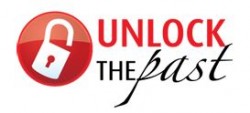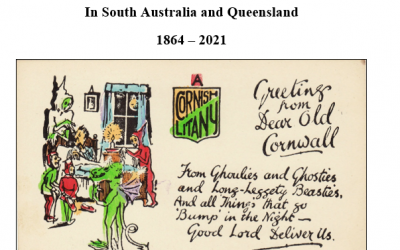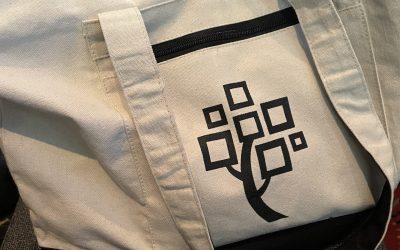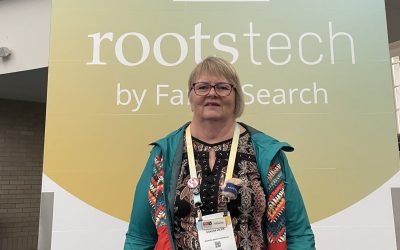 Back in May I was both a speaker and an attendee at the Unlock the Past Researching and Writing History seminar in Adelaide. I wrote a review of it and said that I would write more about my own session. After months of travelling around I am finally getting around to it.
Back in May I was both a speaker and an attendee at the Unlock the Past Researching and Writing History seminar in Adelaide. I wrote a review of it and said that I would write more about my own session. After months of travelling around I am finally getting around to it.
My session was actually on Writing Research Guides which is what I do and I have five titles currently published by Unlock the Past – Your Family History Archives: A Brief Introduction; What Was The Voyage Really Like?: A Guide to Researching Convict & Immigrant Voyages to Australia and New Zealand; Family History on the Cheap; It’s Not All Online: A Guide to Genealogy Sources Offline; and Family & Local History Resource Directory for Victoria. All publications are available from Gould Genealogy & History online.
I knew attendees at the seminar would not be that interested in writing guides so I mainly talked about writing in general and how what I was talking about could be used in any style of writing. The key points I stressed to remember were – audience, purpose, language, spelling, grammar and interesting, not boring. While these six things may seem obvious, people often don’t give them enough consideration.
For me there are some basic inclusions in a book (or whatever) and these include – introduction, abbreviations, glossary, conclusion, bibliography and index. Again this may all seem too obvious but I’m sure most of us know of books without indexes, or lists of abbreviations or references and without a bibliography.
There are various stages in writing including planning, structuring, writing, designing and editing which should all be done in consideration of what the proposed audience needs. A useful tool is the Australian Style Manual 6th edition, 2002 which should be available at your local library. If you are planning a lot of writing then it is a useful resource to have at home.
With my own writing, I like to flesh out the ideas for the topic – it is easier to revise your work rather than start from scratch so get as much down first. Accept that there will be multiple drafts as no one gets it totally right the first time. Read your work out loud as this is where you will find any problems with clarity and poor grammar. You also need to set regular writing sessions and give yourself uninterrupted time otherwise you will find it very hard to write anything in a clear and concise manner.
Another critical factor is to seek feedback and be prepared to accept both praise and criticism (remember no one gets it right first time). Take on board all comments and suggestions and while it is good to get friends to read your work, you should also ask people with no idea about the topic as well. The latter are very good at picking up if something doesn’t quite make sense.
Citations should be clear and concise so that you and others can easily identify what sources you have used. Be careful not to inadvertently plagiarise someone else’s work and make sure you check any copyright issues. The Australian Copyright Council is a good source of information with lots of useful information sheets including one on Family Histories and Copyright.
Illustrations can help to make a publication more interesting but can add to production costs especially if you want colour. Also remember to check any copyright or reproduction right issues – while a photograph may be out of copyright, a library may hold the reproduction rights and may charge a fee.
For me indexing is a critical part of any publication as it allows greater access to all parts of the publication. The Australian and New Zealand Society of Indexers (ANZSI)has some indexing resources on their website which may be useful.
Some basic tools that all writers need include a dictionary and to use a spell checker (but remember that it won’t pick up if you have used a wrong word eg from or form). Writers’ Centres in the various Australian States also usually have writing resources on their websites so check out not only your own State but others as well. My local Centre is the Victorian Writers’ Centre.
There are also professional associations which might be worth a look including the Australian Society of Authors, the Australian Writers’ Guild, and the Fellowship of Australian Writers.
Two books that I find really useful for writing family history in particular are Hazel Edwards‘ How to Write a Non Boring Family History, 2nd edition 2011 and Carol Baxter‘s Writing Interesting Family Histories, 2009. I particularly like Hazel’s recipe for a family history:
Recipe for a Non-Boring Family History
Ingredients:
1 cup of self raising imagination
Dates
Thyme (endless spoonsful)
Researchitus (diluted)
Sprinkles of ancestral curiosity
Pinch of opportunity
Flakes of serendipity
Intriguing title, cover and blurb
zest of reader-researcher
half a litre of language including mixed fruit of adjectives (use moderately)
half a dozen embryonic ideas (egg shaped)
Slurp of suspense, secrecy or drama
Dash of inspiration
Method:
Dash inspiration on all pages.
Mix all data and especially dry ingredients in computerised container. Keep for an appropriate time. Heat emotions or ice-over disputes. For special occasions, decorate and display at reunion, anniversary or family gathering.
Result:
Historical readaholic or relative indigestion due to over much hot air.
Originally published in Hazel Edwards Writing a Non Boring Family History (Hale and Iremonger)1997 and kindly reproduced in this blog with the author’s kind permission.
In conclusion this has been a very brief overview of writing in general, and I have not attempted to cover publishing issues. That’s a blog for another time. Points to note about writing are to define your topic and scope at the beginning, always remember who the audience is, seek feedback along the way rather than at the very end and finally, enjoy yourself. You are writing to share your knowledge of the family with others and to ensure that the stories are not lost to future generations. Good luck!





Thanks for this post, a concise guide.
I had Hazel in her “Hippotamus” picture book days visit a couple of the schools I worked in. She was a hoot and the kids loved her. When she addressed Teacher Librarians I enjoyed the stories of her Antarctic trip.
An interesting and helpful post, Shauna. I agree that reading what you’ve written out loud will quickly highlight the cumbersome passages. I’d also recommend Noeline Kyle’s book “Writing Family History Made Very Easy”. Pauleen
Thanks Pauleen – yes Noeline Kyle’s books are also great and I do mention them in my talks too, just missed (somehow) including them in this blog post.